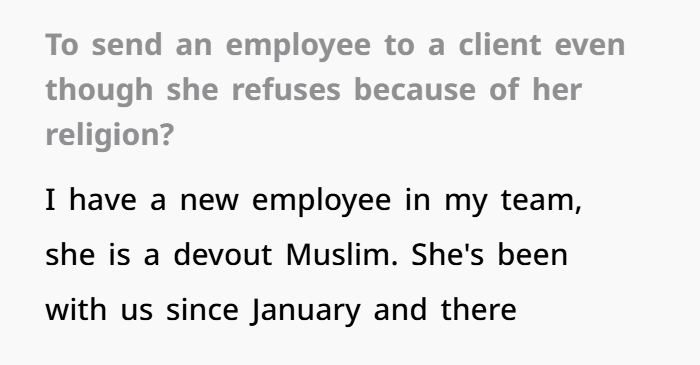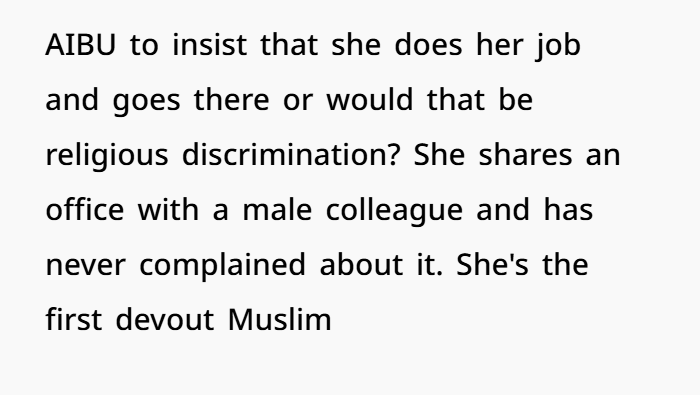Muslim Employee Declines One-on-One Meeting with Male Client Due to Religious Beliefs — Expert Weighs In
Balancing religious accommodations with operational needs remains a delicate challenge in modern workplaces, especially when faith-based practices conflict with job duties. This story—centered on a devout Muslim employee’s refusal to attend a male-only client meeting—has sparked intense online debate, with over 600 replies dissecting where professional obligation ends and religious rights begin.
A team lead, having had no prior issues with a well-performing new hire, was surprised when the employee declined a client site visit on religious grounds. Her refusal was based on the Islamic principle of avoiding prolonged seclusion (known as khalwa) with unrelated men. The manager is now caught between honoring the employee’s religious freedom and meeting client expectations. Is this a clear-cut case of religious accommodation, or does job responsibility override personal belief?
When a person’s religious beliefs come in the way of their ability to work or carry out tasks, they have to decide what their stance is in that situation

The poster explained that she had hired a Muslim employee and that there had been no issues with her work until she refused to meet a male client as she’d be alone with him





Navigating the intersection of religious beliefs and workplace responsibilities requires a nuanced understanding of legal obligations and a commitment to fostering an inclusive environment. In the scenario you’ve described, where an employee declines an assignment due to religious convictions, it’s essential to approach the situation with sensitivity and adherence to legal frameworks.
Legal Framework

Under the UK’s Equality Act 2010, religion or belief is a protected characteristic. This legislation mandates that employers must not discriminate against employees based on their religious beliefs and should make reasonable accommodations to allow employees to practice their religion. mwnuk.co.uk+13Wikipedia+13Acas+13EEOC
Reasonable Accommodations
Employers are encouraged to consider reasonable adjustments to accommodate an employee’s religious practices. However, the law does not require accommodations that would impose a disproportionate burden on the operation of the business. For instance, if an employee’s refusal to undertake certain duties due to religious beliefs significantly hampers business operations, the employer is not obligated to accommodate such requests. EEOC+1Acas+1
Balancing Rights and Responsibilities
While employees have the right to practice their religion, they also have contractual obligations to fulfill their job duties. If a specific task is integral to the role and an employee refuses to perform it on religious grounds, the employer must assess whether accommodating this refusal is feasible without causing undue hardship to the business. If no reasonable accommodation can be made, and the task is essential, the employer may have grounds to insist on its completion.
Indirect Discrimination Considerations
It’s also important to consider the potential for indirect discrimination. Implementing a policy or practice that applies to all employees but places individuals of a particular religion at a disadvantage could be deemed indirectly discriminatory unless it can be objectively justified. Thewlis Graham Associates
Practical Steps Forward

- Open Dialogue: Engage in a respectful conversation with the employee to understand the specific nature of her concerns. This dialogue can provide insights into potential accommodations or alternative solutions.
- Assess Business Impact: Evaluate whether reassigning the task or modifying the assignment would cause undue hardship to the business operations.
- Seek Legal Counsel: If uncertainty persists, consulting with legal professionals specializing in employment law can provide clarity and ensure compliance with legal obligations.
- Document Decisions: Maintain thorough records of all discussions and decisions made regarding the accommodation request. This documentation can be invaluable if disputes arise later.
Folks provided the poster with many suggestions, from talking to Human Resources to even letting the woman go






Striking a balance between respecting religious beliefs and maintaining business efficacy is a complex but essential endeavor. By approaching the situation with empathy, open communication, and a clear understanding of legal responsibilities, employers can navigate such challenges effectively, fostering an inclusive and legally compliant workplace.

